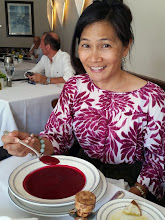There were some obvious treasures, like the bamboo and silicone cooking spoon, "spork," and spatula from the California Cling Peach Board. There were some things that had intrinsic value but that I didn't know yet what to do with, like the generous bags of succulent dried figs from California Figs and the candy-like glass beads that I bought at Capital City Beads. And there were things that I am reluctantly letting go of, like the uber-yummy box of "Tango" cherry tomatoes from Windset Farms that I rationed out for a week (where in the world can I get more?!) - and the original draft of this post, which to my chagrin, I accidentally deleted.
 |
| Peachy keen: Caprese salad with cling peaches, basil, and walnuts, served up by the California Cling Peach Board. |
It was heartening to learn that not all food blogs are dedicated to dreamy photos of perfectly iced cakes or truculent declarations of what constitutes perfect barbeque. And it was enlightening to not only hear from bloggers, diners, purveyors, and chefs, but from a largely unsung part of the foodie hierarchy - the farmers, growers, and ranchers who produce the foods that not only California but the entire nation, depend upon and enjoy.
 |
| A merry chase: Apples are a girl's best friend - sort of. Persistent suitor Hippomenes thwarted Atalanta's alpha female by tossing shiny objects in her path. |
Sacramento proved a great host city for IFBC with the unofficial and overarching theme of "America's Farm-to-Fork Capital." While there are many regions in the U.S. where farm-to-fork is also a movement, you have to admit that California produces a staggering percentage of the nation's produce, including specialty crops like wine and nuts.
A 2013 article in Western Farm Press states that thanks to California's soil and climate, the seemingly endless variety of crops grown here - including walnuts, plums, celery, and garlic - represent percentages in the the high 90s of the nation's harvest. Indeed, the label of "California" that precedes figs, walnuts, olives, almonds, and any number of other signature crops has long designated their pedigree of sunny fields and an idyllic Mediterranean climate.
 |
| A verdant flatbread pizza with California Figs, served up at IFBC's "Taste of Sacramento" bash. |
M.F.K. Fisher wrote, "First we eat, then we do everything else." I would amend that to say that before we get to eat, there is everything else to do. IFBC showcased not only the great talent among writers, chefs, farmers, and other stakeholders in the state's food community, but the inherent humanity among those who spend their lives and careers in the study of how we eat.
A panel discussion featured three food bloggers whose passion for writing and food led somewhat organically but surprisingly in directions to do good. Amber Stott founded The Food Literacy Center, a nonprofit based in Sacramento that goes into low-income elementary schools to, as its mission statement declares says, "inspire kids to eat their vegetables." Catherine Enfield was able to create the Sacramento Food Film Festival, which organically has become the Food Literacy Center's signature fundraiser. And Rodney Blackwell, who writes Burger Junkies, ended up founding the Sacramento Burger Battle to highlight the city's best burger chefs and raise money for the Crohn's and Colitis Foundation of America.
Along with discussions of the more nobler aspects of social justice, and the conscientious production, purchase, and preparing of food, delegates to IFBC had the opportunity to participate in one very critical activity: eating. Proximity to vineyards, world-renowned produce, and the creative food community of Central California, Sacramento has become a foodie mecca that rivals even a metropolis such as Los Angeles - without the traffic.
 |
| Lindsay's new Party Picks can turn that next martini into one of your "five-a-day" with more than the ubiquitous olive. |
I finally learned that "cling" peaches are a variety of fruit that does not easily release the stone when ripe. This allows the peaches to retain their shape when undergoing the canning process. While I am not a great fan of canned fruit, having eaten my share of it in the culinarily beige 1970s, I was pretty impressed by the "Caprese" salad of cling peaches, walnuts, basil, and mozzarella cheese served up by representatives of the California Cling Peach Board. And Lindsay, purveyors of those buttery black olives that as kids we all liked to wear like thimbles on our fingers, previewed Party Picks, tiny skewers of their cocktail olives and pickled vegetables, ready to embellish your next shaken-not-stirred.
 |
| Poached pear in wine at Aioli Bodega Espanola. |
Whenever I return home from a trip, it still feels like I am in a new place, even though I have returned without fanfare to my usual routines and habits. For a while, all of those well-worn path, while familiar, seem to harbor new possibilities.
I'm looking forward to IFBC next year, which will be held again in Sacramento. Being able to see where our food comes from In the meantime, as I recall the conference in this blog, enjoy my edible mementos, and share my experiences with friends and family who have been so supportive of GMS, I will continually unpack my "suitcase" of impressions and with them the ability to see blogging about food through new eyes and think about where it will lead me in the future.






No comments:
Post a Comment